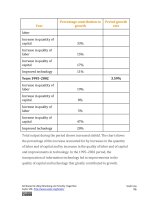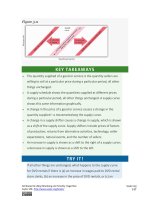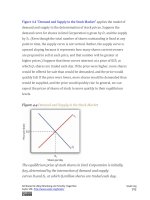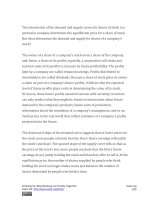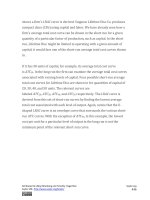Authors libby rittenberg 456
Bạn đang xem bản rút gọn của tài liệu. Xem và tải ngay bản đầy đủ của tài liệu tại đây (320.99 KB, 1 trang )
2. The local oil refinery plans a complete restructuring of its
production processes, including relocating the plant.
3. A farmer increases the quantity of water applied to his or her
fields.
4. A law partnership signs a 3-year lease for an office complex.
5. The university hires a new football coach on a 3-year contract.
2. “There are no fixed costs in the long run.” Explain.
3. Business is booming at the local McDonald’s restaurant. It is
contemplating adding a new grill and french-fry machine, but the day
supervisor suggests simply hiring more workers. How should the
manager decide which alternative to pursue?
4. Suppose that the average age of students in your economics class is
23.7 years. If a new 19-year-old student enrolls in the class, will the
average age in the class rise or fall? Explain how this relates to the
relationship between average and marginal values.
5. Barry Bond’s career home run average in his first 15 years in major
league baseball (through 1997) was 33 home runs per season. In 2001,
he hit 73 home runs. What happened to his career home run average?
What effect did his performance in 2001 have on his career home run
average? Explain how this relates to the relationship between average
and marginal values.
6. Suppose a firm is operating at the minimum point of its short-run
average total cost curve, so that marginal cost equals average total
cost. Under what circumstances would it choose to alter the size of its
plant? Explain.
7. What happens to the difference between average total cost and
average variable cost as a firm’s output expands? Explain.
Attributed to Libby Rittenberg and Timothy Tregarthen
Saylor URL: />
Saylor.org
456
